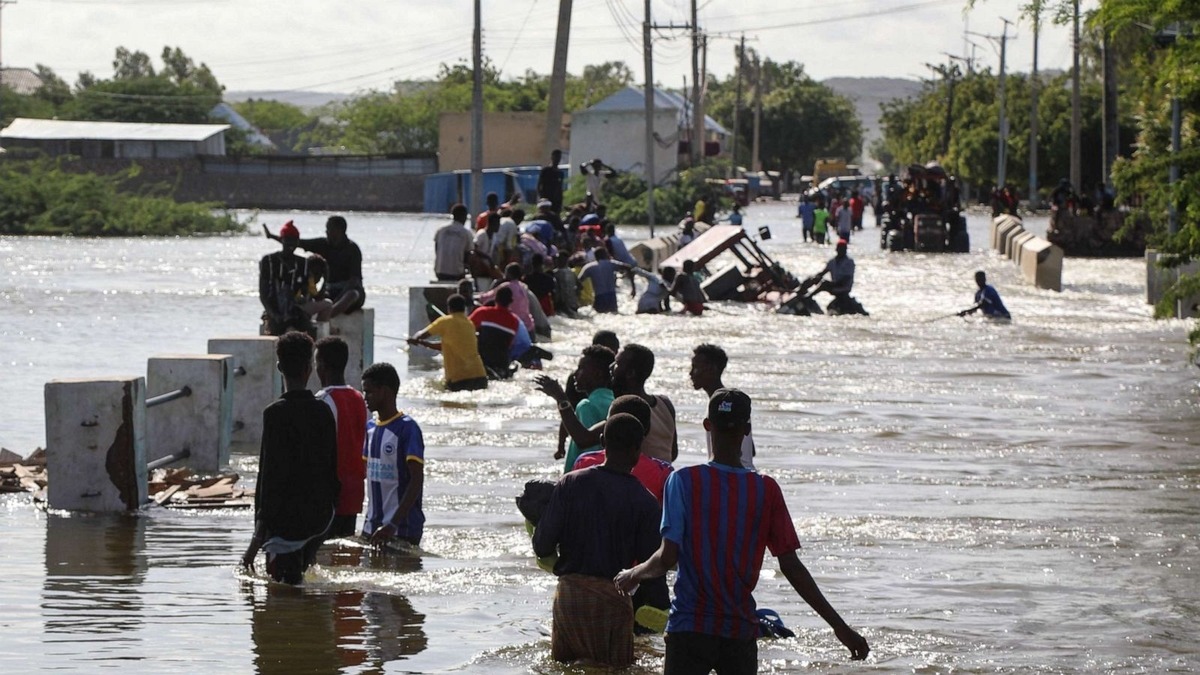Somalia is grappling with a severe state of emergency as the country faces intensified flooding worsened by the El Nino weather phenomenon. Regions of Somalia have been hit hard by heavy rainfall, leading to destructive floods that have displaced thousands and left communities in turmoil.
One of the hardest-hit areas is the densely populated town of Beledweyne, located near the border with Ethiopia. The Shabelle River, swollen from the excessive rainfall, has breached its banks, resulting in the destruction of numerous homes and forcing residents to seek refuge on higher ground. The situation has compounded the challenges faced by families who had previously fled drought and violence, only to find themselves confronted with another calamity.
Hakima Mohamud Hareed, a mother of four, including a disabled child, expressed the desperate plight of her family. Having recently moved to Beledweyne to escape conflict, they now find themselves battling the floods. The displacement camp where they sought shelter, known as Kutiimo, was not spared from the devastation. Their small, tattered tent was washed away by the floodwaters, leaving them with nothing but their lives. It has been a traumatic experience for them, underscoring the urgent need for assistance.
Save the Children, a humanitarian organization, estimates that approximately 90% of Beledweyne’s population, or around 250,000 people, have been displaced by the flooding. The federal government of Somalia declared a state of emergency in October due to the extreme weather conditions exacerbated by El Nino. Homes, roads, and bridges have been destroyed, exacerbating the humanitarian crisis.
El Nino is a temporary and periodic warming of a portion of the Pacific Ocean, which influences weather patterns worldwide. Its impact is most severe during December through February. Scientists believe that climate change is amplifying the intensity of El Nino episodes. Consequently, Somalia, along with neighbouring countries such as Kenya and Ethiopia, continues to experience torrential rainfall. Aid agencies have described the flooding as an uncommon phenomenon, resulting in the loss of at least 130 lives across the three countries.
The United Nations-backed Somali Water and Land Information Management project has warned of a flood event of unprecedented magnitude, statistically expected to occur once in a century. The rainy season, which extends until December, poses a significant threat to approximately 1.6 million people in Somalia alone.
The devastation in Beledweyne is particularly severe, with homes being swept away by the floodwaters. Although Hakima’s family is safe from immediate flooding in their camp, they face new challenges of hunger and the desperate need for adequate shelter. They implore their fellow Somalis to come to their aid, as their survival hangs in the balance.
Mukhtar Moalim, the owner of a retail shop in Beledweyne’s market, recounted the frantic efforts he and his relative made to save their property when the river burst its banks. Their attempts to block the water from entering the shop proved futile as the water levels continued to rise, jeopardizing their residence above the store.
Hassan Issee, who manages emergency operations at the Somalia Disaster Management Agency, confirmed that the situation is grave, with at least 53 deaths reported across Somalia due to flooding. Efforts are underway to provide relief to the affected people, but the scale of the disaster requires substantial support.
Even the capital city, Mogadishu, has not been spared from the impact of the floods. Major roads, including the crucial route to the airport, have been submerged, further exacerbating the challenges faced by the population.
Prime Minister Hamza Abdi Barre, speaking from the Dollow district of the Gedo region, where numerous families have been displaced, appealed to the international community for assistance. While the government is making every effort to address the crisis, additional support is urgently needed to alleviate the suffering of the affected population.


